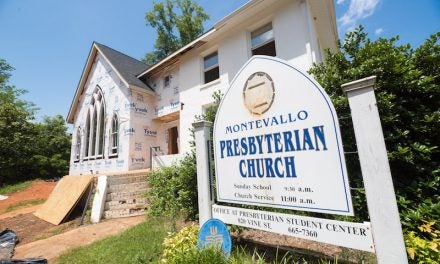Shelby County survivors share their stories and why heart health’s important
Written By Lauren Dowdle
Photos By Dawn Harrison

After having her daughter Martha-Mae, Lura Denson needed open-heart surgery to repair her enlarged heart.
Parents hope and pray their babiy will be healthy. So when they learn there is something wrong with their infant’s heart, it’s hard not to become upset, fearful and worried about what the future holds.
And there are two local families that know those emotions all too well.
Lura Fuller Denson was born with Tetralogy of Fallot, which is a rare condition caused by a combination of four heart defects that are present at birth.
“My mom was about to take me home from the hospital, but I turned blue,” Denson explains. “I was a ‘blue baby’ because my heart wasn’t getting enough oxygen.”
So when she was a few months old, her parents moved to Birmingham so she could receive treatment at UAB, at the request of her doctors. It was there that they put in a shunt and she had her first surgery. Two years later, she underwent open-heart surgery.
Although her condition was rare, Denson says she lived a pretty normal life. “I never had any problems until I was older,” she says. “In college, I had a few episodes where I would feel weird because of my heart.”
It wasn’t until Denson had her now-four-year-old daughter, Martha-Mae (Mae Mae), that she and her baby experienced complications. She was told her daughter had a heart murmur, which made Denson worried. She got in a glimpse into what her mother may have felt at her birth.
But after taking Mae Mae to her heart doctor, Denson was relieved to find out there was no murmur.
Denson went for her own check up the next day and found out her heart had become enlarged during her pregnancy, so she had another open-heart surgery. She will also need another valve replacement sometime in the future, but she’s not worried about it.
“You can’t live your life in fear of what is going to happen,” she says. “I try to live as normal of a life as possible.”
She urges people to focus on their heart health and go to the doctor if they have any symptoms.
“It’s so vitally important to always keep a check on those kinds of things,” Denson says about heart health. “Heart disease affects everyone out there. It’s the No. 1 killer.”
Another resident who has seen the effects of heart defects is Anne Marie Ellis. Her son, James, was born with pulmonary stenosis, which is a defective pulmonary heart valve.
Luckily, this type of heart defect is fairly easy to treat, Anne Marie says. James stayed in the hospital for 15 days after he was born and went underwent surgeries, including a valvuloplasty.
Anne Marie says James is doing great now, and he’ll be eight years old in July.
While some people are born with heart conditions, like Denson and James, others get them later in life. Some risk factors include the person’s age, gender, family history, diabetes, smoking, poor diet and physical inactivity, according to the American Heart Association.
Alabama has the second highest death rate from cardiovascular disease in the United States, according to the Centers for Disease Control and Prevention. And heart disease is the No. 1 killer of Alabamians.
Visit Heart.org for more information on heart health.
Heart Health Facts
610,000 people die of heart disease in the United States every year.
735,000 Americans have a heart attack annually.
43 seconds How often a heart attack strikes someone
80 percent of cardiovascular diseases are preventable
Do you know the warning signs?
- Chest pain or discomfort
- Upper body pain or discomfort in the arms, back, neck, jaw or upper stomach
- Shortness of breath
- Nausea, lightheadedness or cold sweats











